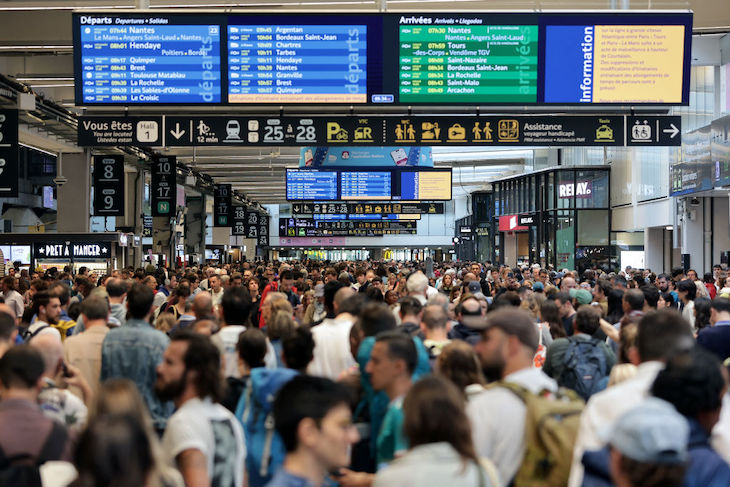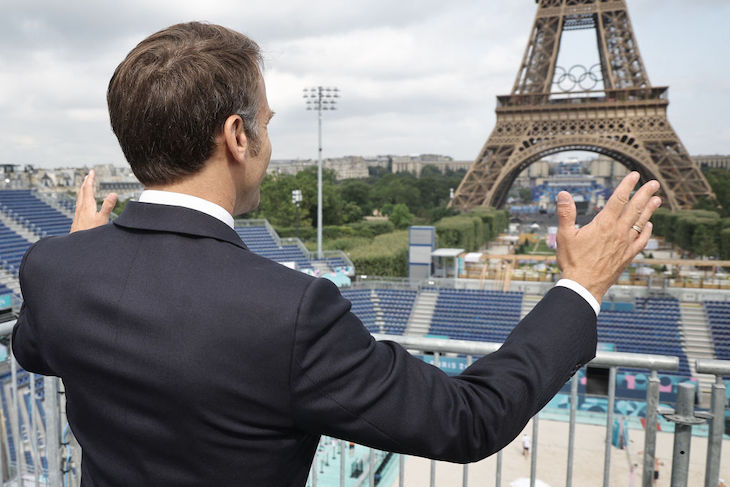(sublinhados meus)
France descends into chaos hours before the Olympics starts

France’s Olympics could not have got off to a worse start. Hundreds of thousands of train passengers have been left stranded after the country’s high-speed rail lines were targeted by a series of suspicious fires. Rail company SNCF says it’s a ‘massive attack aimed at paralysing the network’, with security services suggesting this morning that the far left may have been behind the attack. Whoever is to blame, one thing is clear: France’s president Emmanuel Macron will be furious. The world’s eyes are on Paris tonight as the opening ceremony gets underway. Macron wanted them to see France at its best; instead, they will see a country in chaos.
The man behind tonight’s opening ceremony of the Paris Olympics is Thomas Jolly. True to his surname, the theatre director promises a stunning show that will surprise and thrill. Above all, the ceremony will be a ‘celebration of cultural, linguistic, religious and sexual diversity in France’.
No one can argue that France is diverse, but is there much to celebrate? There once was.

The last great global event France hosted was the football World Cup in 1998 and, for the first time in their history, the French won the tournament. It was a gloriously diverse team. They were dubbed ‘black-blanc-beur’ (beur is a colloquial word denoting someone born in France of North African heritage, such as Zinedine Zidane, the star of the 1998 triumph). More than one million French partied in the Champs-Elysées after the 3-0 thrashing of Brazil in the final.
It was the high point of what the French call vivre-ensemble, or ‘live together’; a favourite phrase of politicians at the time, today it is rarely heard.
‘Live together’ began to die out a decade ago. In June 2016, France hosted the European football championships and to coincide with the event the sports sociologist William Gasparini reflected on that 1998 victory. In his view, it was a time when the West brimmed with confidence, the ‘end of history’, as we were told. ‘Unemployment was falling, the economy was performing well and France was winning,’ explained Gasparini. The euphoria evaporated in the new millennium.
Gasparini cited the 9/11 attack in 2001 as a significant factor in the deterioration of vivre-ensemble because some French began to regard their Muslim fellow citizens with suspicion.
In his 2004 book, The War for Muslim Minds, France’s leading expert on Islamism, Gilles Kepel, contrasted the hospitality of Britain in granting asylum to figures from the Islamic world to the intransigence of France. ‘What French officials fear is that the social malaise felt by Muslims in the suburbs of major cities…will be expressed as religious extremism, leading eventually to violence and terrorism,’ wrote Kepel.
This fear has been realised, not because France began granting asylum to radicals but because of the emergence of the internet. Kepel pinpoints the launch of YouTube in 2005 as a seminal moment in the re-Islamification of some young European Muslims. Extremists used the site to proselytise and propagandise, and the results have been dramatic.
A major survey in 2020 reported that three quarters of French Muslims under 25 placed Islamic law over Republican law; among the over 35s, this figure fell to a quarter.
Asked in 2016 if France could ever return to the vivre-ensemble of 1998, Gasparini replied: ‘I don’t think we can go back on this enchanted interlude…we are now in a France that is in doubt’.
The following month, in Nice, an Islamist in a 19-ton truck murdered 86 people who were celebrating Bastille Day. That was the last of the large-scale massacres in France, but since then there have been many more Islamist attacks, including the murder of two school teachers.
Far from being a country of vivre-ensemble, France has become a nation where its citizens live ‘face to face’. Those are the words of the former minister of foreign affairs, Gérard Collomb, uttered when he resigned his post in 2018.
It was meant as a warning to French president Emmanuel Macron, but Collomb’s cri du cœur went unheeded. Worse, through his indifference and incompetence, the president has stirred anger among another demographic afflicted by a similar ‘social malaise’ to that experienced by many French Muslims in the inner cities. These are the ‘proles’ in the provinces, the yellow vests who demonstrated their discontent on the street in 2018 and then at the ballot box last month.
In the Europeans elections this summer, Marine Le Pen’s National Rally triumphed in 93 per cent of the country’s municipalities and in 96 out of 101 departements. Only the cities offered any resistance; here the radical left La France Insoumise (LFI) did well, campaigning on little else than the plight of Palestinians in Gaza. This appealed to Progressives and also Muslims, 62 per cent of whom voted for LFI in the European elections.
The National Rally also dominated the first round of voting in the parliamentary elections and would have won a majority of seats in the second round but for a hastily concocted ‘cordon sanitaire’ by Macron’s centrists and the bourgeoise left.
According to the historian of French Institutions, Philippe Fabry, the cordon sanitaire is ‘no longer ideological, it is sociological’, a revival of the class contempt that characterised the last years of Louis XVI’s reign: ‘The nobility of the Republic is refusing to allow the people to intrude into their place of life and power,’ was how he described Macron’s strategy to Le Figaro this week.
Perhaps nothing demonstrates the collapse of France’s multicultural myth more than two op-eds published during the recent parliamentary elections: one was signed by 80 prominent Muslims and it urged people not to vote for the National Rally because of their ‘racism’. The other was backed by 100 notables, many from France’s Jewish community, and urged people not to vote for the left-wing New Popular Front because, they said, it was a ‘threat’ to Jews.
This is the bitter reality of France today; a country with deep and dangerous fractures. This won’t, of course, be on display this evening. We’ll be treated to Macron’s version of France, a Progressive Utopia. If pipe dreaming was an Olympic event, Macron would win gold.
Sem comentários:
Enviar um comentário